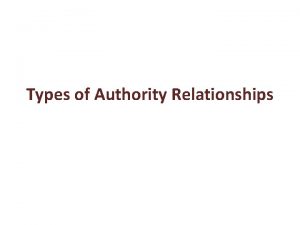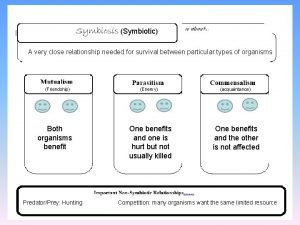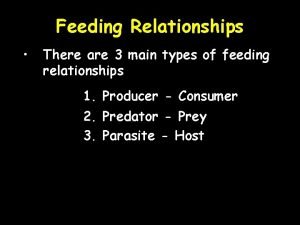Types of Authority Relationships Line Authority Line authority







- Slides: 7

Types of Authority Relationships

Line Authority • Line authority refers to those positions and elements of the organization which have responsibility and authority and are accountable for accomplishment of primary objectives. • Line elements provide authority to decide and direct and a central means for the flow of communication through a scalar chain of authority. • It should be remembered that the primary purpose of line authority is to ensure effective functioning of the organization. It does so in the following ways: i. Line authority acts as a chain of command from chief executive to lower level workers. It also provides for the channel of communication. ii. It provides the basic decisions required for operating the enterprise. iii. It makes leadership process effective by establishing authentic channels of communication. iv. It provides points of reference for the approval or rejection of proposals.

v. It serves as a means of control by setting limits to the scope of managerial actions. Line

Staff Authority • Staff refers to those elements which have responsibility and authority for providing advice and services to line in attainment of objectives. • Line managers make the salient decisions be exercising command authority, whereas staff officials advise and counsel, with no authority to command but within their own staff chain of command. • Basic Activities such as production, finance and marketing are usually line departments. • Activities such as industrial engineering and costing, which consist mainly of assistance, advice or services cutting across several units, are generally set up as staff departments. • However, the indirect relationships of staff to primary objectives does not necessarily mean lack of importance. • Pure staff authority has no right to command except within the staff department.

• Staff managers cannot issue orders. They work by planning, thinking, studying, informing, recommending, persuading and suggesting. • Thus, staff orientation is different from the line orientation which is concerned directly with the primary objectives of the enterprise. Types of Staff: a) Personal Staff: It refers to the positions created to help a manager in carrying out those parts of his responsibilities which he does not want to delegate to others. Personal staff is required by top managers because their responsibilities grow beyond personal capacities. For example, a general manager of a company may have a personal secretary to help him in carrying out his responsibilities. b) Specialised Staff: It counsels, advises and helps all line and other staff elements in the organization. It consists of specialists in different areas like accounting, quality control, personnel, public relations, etc. Staff specialists generally provide both advice and service to the line departments of the organization.

c) General Staff: It consists of a group of experts in different areas who are attached to the central office of the organization. It is generally employed to provide advice on certain matters to the top management.

Types of Authority Louis Allen has classified authority into three categories: i. Authority of Knowledge: is possessed generally by the staff specialists appointed by the company. They more often influence the actions of persons in line by virtue of their knowledge. ii. Authority of Position: some persons acquire authority by virtue of their position in the organization. iii. Legal Authority: is the authority which is entrusted to a person by law of land.













